Complete Solutions to EXAMPLE of chapter THE SOLID STATE of Class 12 book with complete answers and questions
| Class 12 | CHEMISTRY |
| Chapter | THE SOLID STATE |
| MAXIMUM PUBLICATION | EXAMPLE |
| Number Of Questions | 100 |
| Academic Year | 2023-24 |
The 14 possible three dimenstional crystal lattices are called ͟ ͟ ͟ ͟ ͟ ͟ ͟ ͟
View SolutionWhich of the following type of cubic lattices has maximum number of atoms per unit cell?
View SolutionF- centres in an ionic crystal are
a. lattice sites containing electrones
b. interstitial sites containing electrons
c. lattice cites that are vacant
View SolutionThe colour imparted by excess potassium in KCI crystal is ͟ ͟ ͟ ͟ ͟ ͟ ͟ ͟
View SolutionWhich of the following substances show antiferromagnetism?
View SolutionThe number of tetrahedral and octahedral voids in a ccp array of 100 atoms are respectively
View SolutionPotassium dichromate belongs to which crystal system
View SolutionA solid compound contains XYZ atoms in a cubic lattice with X atoms occupying the corners, Y atoms in the body centred positions and Z atoms at the centres of faces of the unit cell. What is the empirical formula of the compound
View SolutionThe empty space in body centred cubic lattice is
View SolutionWhich solid has weakest intermolecular force
View SolutionIn crystalline solid, atoms, ions or molecules are held in an orderly array. But some point defect is observed in a crystal, when a vacancy is created by an atom or ion dislocated from its normal position to an interstitial site. What is the defect called?
View Solution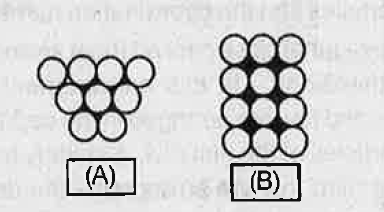
Write the names of A and B?
View Solution
Identify and write the name of the shaded parts of A and B?
View SolutionTeacher said that Frenkel defect will not happen in alkali metal halides. Ramu asked the reason for this.
Can you explain?
View Solution"Dielectric substances are related to conductors. "Dielectric substances do not conduct electricity at normal condition"
These are two arguments of a class discussion.
Do you agree with these arguments?
View Solution"Dielectric substances are related to conductors. "Dielectric substances do not conduct electricity at normal condition"
These are two arguments of a class discussion.
If yes, justify both statements?
View Solution
Identify A and B.
View Solution
Explain them.
View SolutionName the unit of magnetic moment
View SolutionMatch the following.
Paramagnetic - `Fe_3O_4`
Ferromagnetic - `O_2`.
Antifemomagnetic - `CrO_2`
Ferrimagnetic - MnO
View SolutionAll crystals exhibit imperfections.
a) Which law is related to this statement?
b) Draw the picture showing Frenkel defect.
View SolutionAll crystals exhibit imperfections.
Draw the picture showing Frenkel defect.
View SolutionWhat do you mean by Anisotropy how is it differ from isotropy
View SolutionA cubic solid is made of two elements P and Q. Atoms of Q are at the corners of the cube and P at the body-centre. What is the formula of the compound? What are the coordination numbers of P and Q?
View SolutionPacking efficiency differ for B.C.C, F.C.C and Simple cube what is packing efficiency?
View SolutionIf NaCl is doped with `10^-3` mol % of `SrCl_2`, what is the concentration of cation vacancies?
View SolutionEven crystal, the substance which we consider as the most perfect solid, shows some defects or imperfections.
Which law in thermodynamics deals with this topic?
View SolutionEven crystal, the substance which we consider as the most perfect solid, shows some defects or imperfections.
Explain the law.
View SolutionExcess of Li makes LiCl crystal pink and excess of K makes KCI crystals lilac. Is this true? How will you account for the above processes?
View SolutionWhat are the consequences of Schottky and Frenkel defects?
View SolutionCalculate the number of atoms per unit cell of silver which crystallizes in fcc lattice.
View SolutionExplain the type of voids found in three-dimensional close packing in crystals.
View SolutionIn an answer paper a student wrote as "carborundum crystals are very soft."
Do you agree with this?
View SolutionIn an answer paper a student wrote as "carborundum crystals are very soft."
What is your opinion?
View SolutionIn an answer paper a student wrote as "carborundum crystals are very soft."
In which crystal type carborundum is included?
View SolutionIn an answer paper a student wrote as "carborundum crystals are very soft."
Substantiate your view.
View SolutionDuring a seminar a student asked another student, "Can NaCl give flame test?"
a) Write your answer.
View SolutionDuring a seminar a student asked another student, "Can NaCl give flame test?"
Write the colour of sodium during flame test.
View SolutionDuring a seminar a student asked another student, "Can NaCl give flame test?"
Write the name of the point which is responsible forthe colour of alkali metal halides having excess metal ions.
View SolutionSolids are classified into two types.
What are they?
View SolutionSolids are classified into two types.
Give two examples.
View SolutionSolids are classified into two types.
Give 3 features of them
View SolutionTeacher explained that due to a stoichiometric defect, the density of a crystal changes.
Name the defect.
View SolutionTeacher explained that due to a stoichiometric defect, the density of a crystal changes.
What change can we observe?
View SolutionTeacher explained that due to a stoichiometric defect, the density of a crystal changes.
Give an example.
View SolutionPacking efficiency is the percentage of total space filled by the particles.
Which of the following lattices has the highest packing efficiency?
Simple cubic lattice, body centered cubic lattice, hexagonal close packed lattice
View SolutionAn element has a body centred cubic structure with a cell edge of 288 pm. The density of the element is 7.2 g/`cm^3`. How many atoms are present in 208 g of the element?
View SolutionDerive packing efficiency of
ccp and hcp structure
View SolutionDerive packing efficiency of
body centered cubic
View SolutionDerive packing efficiency of
Simple cubic
View SolutionIron (Il) oxide crystallise in cubic structure with unit cell edge of 5.0Å If the density of the oxide is 3.8 g cm-3 . Calculate the no. of `Fe^2+` and `O_2-` present in each unit cell. [atomic mass of Fe=56, O=16]
View SolutionWhich are the two types of close packing in two dimension. What are its differences?
View SolutionClassify the following solids as ionic, metallic, molecular, network (covalent) or amorphous.
i) Tetraphosphorus decoxide `(P_4O_10)`
ii) Ammonium phosphate `(NH_4PO_4)`
iii) SiC
iV) `I_2`
vi) Plastic
vi) Graphite
vii) Brass
ix) Rb
x)LiBr
xi) Si
View SolutionA substance 'A' crystallizes in fcc lattice.
Calculate the number of atoms present per unit cell of 'A'.
View SolutionA substance 'A' crystallizes in fcc lattice.
In a crystalline solid AB, some vacancy is produced by missing of equal number of oppositely charged ions. What is the defect called?
View SolutionWhat is meant by the term coordination number?
View SolutionWhat is the coordination number of atoms:
i) in a cubic close-packed lattice?
ii) in a body-centred cubic structure?
View SolutionIdentify the crystal
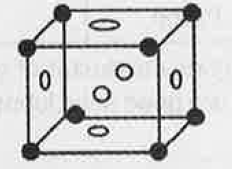
Write the name of the crystal.
View SolutionIdentify the crystal

How many particles are present in the unit cell of this crystal?
View SolutionIdentify the crystal

Write the relation connecting edge length and radius of the particle.
View SolutionThe following diagram shows the alignment of magnetic moments for some magnetic properties.
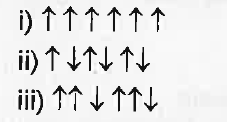
Identify the magnetic properties denoted by (i),(ii),(iii).
View SolutionExamine the substances `H_2O`, NaCl, `C_6H_6` and name the magnetic property common to them.
View SolutionHow many lattice points are there in one unit cell of the following lattices?
Face centred cubic
View SolutionHow many lattice points are there in one unit cell of the following lattices?
Body centred cubic
View SolutionHow many lattice points are there in one unit cell of the following lattices? Simple cubic
View SolutionClassify the following into crystalline and amorphous solids.
NaCl ,Graphite , Plastic, Diamond, Rubber, KCI, Wood, `CaC0_3`, Iodine .
View SolutionWrite any two properties of graphite.
View SolutionFill in the blanks.

View SolutionNaCl shows mainly Schottky defect and AgCI shows Frenkel defect. Do you agree with this statement? Justify.
View SolutionClassify the following solids into isotropic and anisotropic.
Polyvinylchloride, Rubber, Glucose, Glass
View SolutionThe common salt, sodium chloride is an example for crystal system with edge length a = b = c and angles α = β = γ = 90°.
Identify the crystal system.
View SolutionThe common salt, sodium chloride is an example for crystal system with edge length a = b = c and angles α = β = γ = 90°.
What happens when sodium chloride crystal is heated in presence of sodium?
View SolutionStoichiometric defects are of two types such as vacancy defects and interstitial defects.
Which defect is basically a vacancy defect in ionic solids?
View SolutionStoichiometric defects are of two types such as vacancy defects and interstitial defects.
Which stoichiometric defect causes the decrease in density of solid?
View SolutionStoichiometric defects are of two types such as vacancy defects and interstitial defects.
)On heating white ZnO it turns yellow. Which is the crystal involved here? Explain.
View SolutionWhy is Frenkel defect not found in alkali metal halides?
View SolutionA crystalline solid has simple cubic structure in which P atoms are present at the corners, Q atoms are present at the edge centres and R atoms are present at the centre of the unit cell.
What is the formula of the compound?
View SolutionClassify each of the following solids as ionic, metallic, molecular, network or amorphous.
a) `I_2` b) Plastic
c) LiBr d) SiC
View SolutionIn terms of band theory differentiate Conductors, insulators & semi conductors
View SolutionOn the basis of nature of constituent particles,crystals are classified into four types.
Which are they?
View SolutionOn the basis of nature of constituent particles ,crystals are classified into four types.
In which type does diamond belongs to? Why?
View SolutionOn the basis of nature of constituent particles,crystals are classified into four types.
Can you say whether Iodine can be written as an example of ionic crystal? Why?
View Solution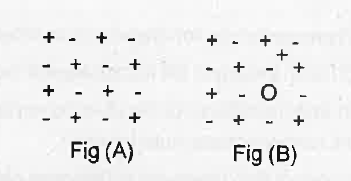
Distinguish between A and B?
c) Give two examples of crystals showing this defect.
View Solution
Explain the defect in figure B.
View Solution
Give two examples of crystals showing this defect.
View SolutionTeacher explained crystal defects in class room.
What are the different types of crystal defects?
View SolutionTeacher explained crystal defects in class room.
Explain with the help of diagram the important difference between Schottky and Frenkel defects?
View SolutionNaCl is an example for diamagnetic substance.
Write an example for paramagnetic substance.
View SolutionNaCl is an example for diamagnetic substance.
What is the difference between ferromagnetic and anti ferromagnetic substances?
View SolutionNaCl is an example for diamagnetic substance.
In case of feri magnetic substances net magnetic moment is not zero. Justify.
View SolutionThe diagram of a cubic crystal whose molecular mass=M, edge length=a, density=P , is given below. N is the Avogrado number.
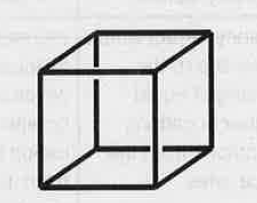
From the above given details find the mass of this cube and also the mass of N particles?
View SolutionThe diagram of a cubic crystal whose molecular mass=M, edge length=a, density=P , is given below. N is the Avogrado number.

By equating these two equations, try to find out a suitable equation for the density of this cube.
View SolutionClassify each ofthe following as being either a ptype or a n-type semiconductor.
a) Ge dopped with In b) Si dopped with B .
View SolutionA compound is formed by two elements P and Q. The element Q forms ccp and atoms of P occupy `1/3^rd` ofthe tetrahedral voids. What is the formula of the compound?
View SolutionSchottky defects and Frenkel defects are two stoichiometric defects shown by crystals.
Classify the following crystals into those showing Schottky defects and Frenkel defects: NaCl, AgCl, CsCl, `CdCl_2`
View SolutionSchottky defects and Frenkel defects are two stoichiometric defects shown by crystals.
Name a crystal showing both Schottky defect and Frenkel defect.
View SolutionSchematic alignment of magnetic moments of ferromagnetic, antiferromagnetic and ferrimagnetic substances are given below. Identify each ofthem.

View SolutionBased on the nature of order, present in the arrangement of the constituent particles, solids are classified into two, crystalline and amorphous.
List out any four points of difference between crystalline end amorphous solids. b) Alist of solids are given below :
Quartz, glass, iodine, ice.
From this, identify crystal (s)
i) having sharp melting point.
ii) which is/are isotropic
View SolutionA list of solids are given below :
Quartz, glass, iodine, ice.
From this, identify crystal (s)
having sharp melting point.
View SolutionA list of solids are given below :
Quartz, glass, iodine, ice.
From this, identify crystal (s)
which is/are isotropic
View Solution
EXAMPLE questions and complete solutions for chapter THE SOLID STATE of MAXIMUM PUBLICATION of Class 12